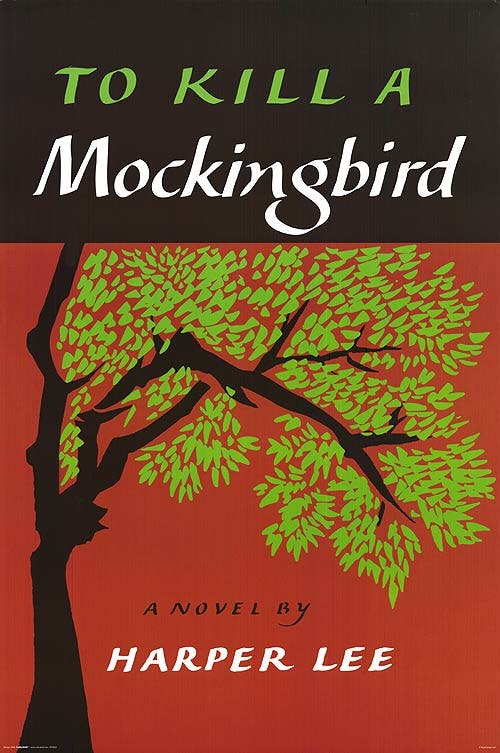 Class Notes---To Kill a Mockingbird
Class Notes---To Kill a Mockingbird
1. Today's Topic:
introduction and summary (Chinese version) (English version 1 . 2 . 3 )
Quotaiton--- SparkNotes . GradeSaver
Quiz--- SparkNotes . GradeSaver
(1) Brief Introduction
To Kill a Mockingbird is a novel by Harper Lee published in 1960. It was immediately successful, winning the Pulitzer Prize, and has become a classic of modern American literature.As a Southern Gothic novel and a Bildungsroman, the primary themes of To Kill a Mockingbird involve racial injustice and the destruction of innocence. Scholars have noted that Lee also addresses issues of class, courage, compassion, and gender roles in the American Deep South.
* Bildungsroman → growing up
In literary criticism, a Bildungsroman is a literary genre that focuses on the psychological and moral growth of the protagonist from youth to adulthood (coming of age), in which character change is extremely important.

(2) Summary
_________________________________________________________________________________________________
Scout and Jem Finch are growing up in the tired old Alabama town of Maycomb. Their father, Atticus, is the local lawyer and as a single parent tries to raise his children with honor and respect to their individualism. With the Depression on times are hard, and there is no money to be found anywhere in town.
To amuse themselves Scout, Jem, and their best friend Dill begin a relentless campaign during their summertimes to get Boo Radley, their reclusive, legendary neighbor, to come out of his house. They concoct endless schemes and even go so far as to create a play that details Boo's life. Atticus forbids them to have anything to do with Mr. Radley, urging them to let the poor man be.
Atticus is a good man, and one day takes on a case that affects him personally. A black man, Tom Robinson, is accused of beating and raping a white woman, Mayella Ewell. Most of the county is convinced immediately that Tom is guilty of the crime, and begin to look at Atticus in a very negative way for actually defending him and trying to do right by him. Scout and Jem begin to get tormented over their father at school, and Atticus begs them not to get riled up over the town's prejudice.
As the trial begins it becomes apparent to Scout and Jem that there is no way that Tom Robinson could have beaten and raped Mayella Ewell, as his left hand is crippled. Atticus proves that to the jury, and Scout and Jem are astonished when Tom is slapped with a guilty verdict anyway. They begin to realize that many people in town are very prejudiced against blacks, and their hearts are saddened by it. It is hard for them to understand how people can be so mean to each other, and they both begin to see that, even in court where things are supposed to be unbiased, men's hearts bring in their own hatreds.
It isn't much longer that Tom is shot and killed for trying to escape while in prison. Jem especially takes the whole affair hard, and it takes him a long time to come to grips with the jury's decision, and Tom's death.
After the trial has died down Bob Ewell, Mayella's father, begins threatening Atticus for embarrassing him in court, and resolves that he'll get him back one way or another. Atticus is convinced that he's all talk, and passes it off as such.
Time crawls past, and finally Bob Ewell is good to his word and attacks the children Halloween night with a knife. He breaks Jem's arm and almost kills Scout, but Boo Radley, of all people, comes to their rescue and saves them. The sheriff, Heck Tate, hushes the whole thing over so Boo Radley will not be dragged into the spotlight, and Scout is thrilled to finally get to meet the man they for so long fantasized about. As she walks him back home, she realizes that all this time he was watching them from his front porch windows, and just for a little while she is able to stand in his shoes.
_________________________________________________________________________________________________
* in someone's shoes
Acting for another person or experiencing something as another person might; in another's position or situation.
ex1: If you were in my shoes, would you ask the new secretary for a date?
ex2: In your shoes I wouldn't accept the offer.
(3) Video Sparknotes --- four major lessons
lesson 1: put yourself in other people's shoes
You don't understand someone until you put yourself in their shoes.
lesson 2: don't kill mockingbirds
Because mockingbird don't eat anyone's plant or harm anything. All they do is make music.
mockingbird's matephorical meaning: anyone who is weak or defenseless
→ To kill the mockingbird is to take the adventage of someone who is weeker than you.
lesson 3: keep fighting even if you know you'll lose
The true bravery is when you keep fighting in persevering even when you know you can't win.
lesson 4: the world is very unfair
(4) Quote in To Kill a Mockingbird
_________________________________________________________________________________________________
Maycomb was an old town, but it was a tired old town when I first knew it. In rainy weather the streets turned to red slop . . . somehow it was hotter then . . . bony mules hitched to Hoover carts flicked flies in the sweltering shade of the live oaks on the square. Men’s stiff collars wilted by nine in the morning. Ladies bathed before noon, after their three-o’clock naps, and by nightfall were like soft teacakes with frostings of sweat and sweet talcum. . . . There was no hurry, for there was nowhere to go, nothing to buy and no money to buy it with, nothing to see outside the boundaries of Maycomb County. But it was a time of vague optimism for some of the people: Maycomb County had recently been told that it had nothing to fear but fear itself.
_________________________________________________________________________________________________
"There is nothing to fearbut a fear itself" is the most famous line from Franklin Delano Roosevelt’s first inaugural speech, made after the 1932 presidential election.

2. Complements:
(1) outcast
The term outcast has its roots in the caste system, a form of social stratification based entirely on a person's birth family (usually paternal). Outside of the caste system are people considered not to belong to any caste; either criminals or socially stigmatized. These people are known as outcasts. While in western cultures this may be seen as unfair, one must consider the culture. There are very radical caste systems as well, an example would be slavery in America.
Question of To kill a mockingbird:
Q: Which two characters are the "outcasts" of the novel, maligned by Maycomb society?
A: Boo Radley and Tom Robinson
(2) vocabulary
1. mal → something bad
ex: malevolent / malignant tumor / malicious gossip
2. bene → something good
ex: benefit / be beneficial to / benevolent
3. fore → 前
ex: forecast / foretell / forehead
4. ver/vir → true
ex: virtual reality / verify / verification
5. dic → to say, tell words
ex: dictionary / dictator / dictatorship / dictation
* under someone's dictatorship
* Has the jury reached your verdict?
6. conscience / conscious / consciousness / subconsciousness
7. peculiarity → a strange or unusual habit or characteristic
(3) tomboy → In To Kill a Mockingbird, Scout is considered to be a tomboy.
A tomboy is a girl who exhibits characteristics or behaviors considered typical of a boy, including wearing masculine clothing and engaging in games and activities that are physical in nature and are considered in many cultures to be unfeminine or the domain of boys.

"A Red, Red Rose" is a 1794 song in Scots by Robert Burns based on traditional sources. The song is also referred to by the title "Oh, My Love is Like a Red, Red Rose", "My Love is Like a Red, Red Rose" or "Red, Red Rose" and is often published as a poem.

_________________________________________________________________________________________________
 "My Love is Like a Red, Red Rose" -- Robert Burns
"My Love is Like a Red, Red Rose" -- Robert Burns 
O my Luve's like a red, red rose
That's newly sprung in June;
O my Luve's like the melodie
That's sweetly play'd in tune.
As fair art thou, my bonnie lass,
So deep in luve am I:
And I will luve thee still, my dear,
Till a' the seas gang dry:
Till a' the seas gang dry, my dear,
And the rocks melt wi' the sun:
I will luve thee still, my dear,
While the sands o' life shall run.
And fare thee weel, my only Luve
And fare thee weel, a while!
And I will come again, my Luve,
Tho' it were ten thousand mile.
_________________________________________________________________________________________________


 留言列表
留言列表


